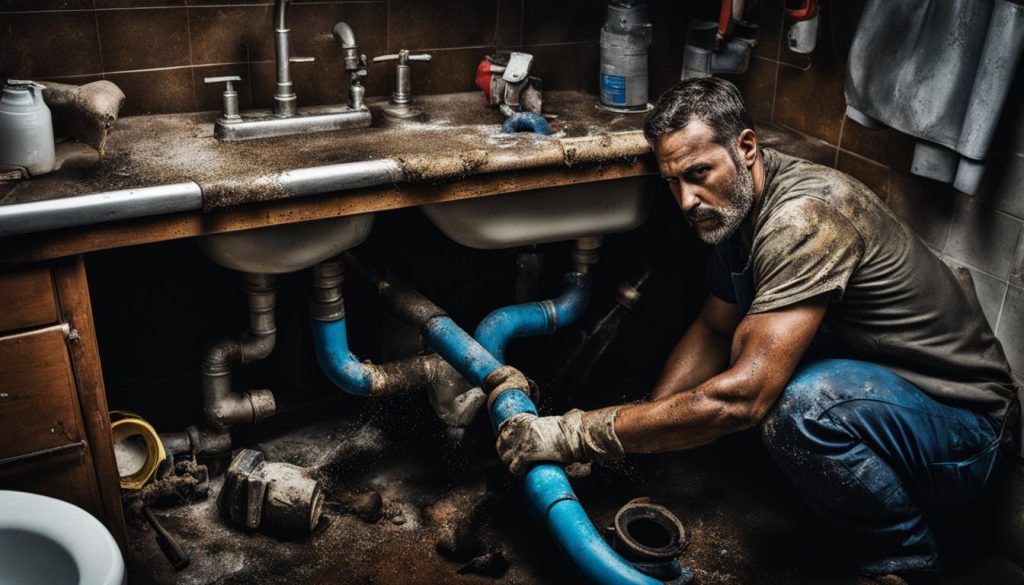Earn Your Plumbing Degree: Start a Lucrative Career
Did you know that plumbing is one of the most in-demand trades in Canada? With a shortage of skilled plumbers, the need for qualified professionals in this field is growing rapidly. Whether you’re considering a plumbing degree, certification, apprenticeship, or training program, now is the perfect time to start your journey towards a rewarding career in plumbing.
Key Takeaways:
- Plumbing is a highly sought-after trade in Canada.
- There is a shortage of skilled plumbers in the industry.
- Starting a career in plumbing can lead to a lucrative and secure future.
- Various education and training options are available for aspiring plumbers.
- Plumbers have the opportunity to make a positive impact and help people on a daily basis.
Why Choose a Plumbing Career
The plumbing trade offers a multitude of reasons why it can be an excellent career choice. From the opportunity to get paid while learning on the job to the variety of challenges you’ll face each day, a career in plumbing offers a unique and rewarding experience. Let’s explore some of the key benefits:
- Get Paid to Learn: Unlike traditional educational paths that require years of studying before entering the workforce, plumbing allows you to earn a wage while obtaining valuable skills and knowledge. Through apprenticeship programs or on-the-job training, you’ll gain hands-on experience and receive industry-specific education, setting a strong foundation for your plumbing career.
- Job Variety: Plumbing is a dynamic trade that offers diverse tasks and projects. From installing and repairing plumbing systems in residential, commercial, or industrial settings to working on new construction projects, each day presents unique challenges and opportunities to expand your skill set.
- Job Security: The demand for plumbing professionals is on the rise, making job security a major advantage in this trade. Regardless of economic conditions, plumbing services remain essential, ensuring a steady flow of work and a stable career path.
- Helping People: As a plumber, you have the ability to make a meaningful impact by assisting people in uncomfortable or distressing situations. Whether it’s fixing a burst pipe, unclogging drains, or ensuring clean water supply, your expertise will be highly valued, and you’ll have the satisfaction of knowing that you’re making a difference in people’s lives.
- Good Money: Plumbing offers the potential for substantial earning. With experience and expertise, plumbers can command competitive salaries. Moreover, the opportunity to work overtime, take on specialized projects, or start your own plumbing business can further increase your income.
- Become Your Own Boss: For those with an entrepreneurial spirit, a plumbing career opens up the possibility of becoming your own boss. You can establish your own plumbing business, manage your team, and have the freedom to shape your career according to your vision and goals.
With these compelling benefits, it’s clear why a career in the plumbing trade is an attractive prospect for those seeking job satisfaction, financial stability, and personal growth.
Pros and Cons of Plumbing
While a career in plumbing offers many advantages, such as good pay and job variety, there are also some realities to consider. Let’s take a closer look at the pros and cons of working in the plumbing industry.
Pros of Plumbing
- Good Pay: Plumbers can earn a competitive salary, especially as they gain experience and expertise in the field.
- Job Variety: Plumbers face different challenges and tasks every day, ensuring that no two days are alike.
- Job Security: The demand for skilled plumbers remains high, providing a level of stability and security in the industry.
Cons of Plumbing
- Dirty Work: Plumbers often have to deal with sewer systems and work in tight spaces, which can be unpleasant and messy.
- Physical Demands: The job requires physical strength and stamina, as plumbers may need to lift heavy objects and work in various weather conditions.
- Non-typical Working Hours: Plumbers may be required to work evenings, weekends, and be on-call for emergencies, which can disrupt personal schedules and family time.
Despite these challenges, many individuals find the rewards of a plumbing career well worth it. The job provides a sense of fulfillment, as plumbers play a crucial role in ensuring the proper functioning of essential systems in homes and buildings.
| Pros | Cons |
|---|---|
| Good Pay | Dirty Work |
| Job Variety | Physical Demands |
| Job Security | Non-typical Working Hours |
Different Sectors in the Plumbing Industry
In the plumbing industry, there are two main sectors: new construction plumbing and service plumbing. Each sector offers unique opportunities and challenges for plumbing professionals. Let’s take a closer look at what these sectors entail:
New Construction Plumbing
In new construction plumbing, plumbers are responsible for installing the plumbing systems in newly built structures. Whether it’s residential homes, commercial buildings, or industrial facilities, new construction plumbers play a vital role in ensuring that the plumbing systems are installed correctly and meet the required standards.
They work closely with contractors, architects, and other professionals to determine the plumbing layout, install pipes, fixtures, and fittings, and conduct inspections to ensure proper functionality. It requires attention to detail, precision, and the ability to work from blueprints and technical specifications.
With new construction plumbing, plumbers have the opportunity to be involved in the early stages of a project and witness it come to life. They enjoy the satisfaction of contributing to the creation of functional plumbing systems in brand new buildings.
Service Plumbing
Service plumbing, on the other hand, focuses on the repair, maintenance, and upgrade of existing plumbing systems. Service plumbers respond to calls from residential, commercial, and industrial clients who require assistance with their plumbing systems.
They troubleshoot issues, identify leaks, repair or replace faulty components, unclog drains, and ensure that the plumbing systems are in proper working condition. Service plumbers often work independently or as part of a plumbing team, visiting different locations and facing diverse challenges on a daily basis.
Service plumbers need excellent problem-solving skills, the ability to work under pressure, and strong customer service skills. They must be able to diagnose issues quickly, provide effective solutions, and communicate with clients in a friendly and professional manner.
Whether you choose new construction plumbing or service plumbing, both sectors offer rewarding opportunities for plumbing professionals. The choice ultimately depends on your preferences, whether you enjoy working with a team in a dynamic construction environment or prefer the versatility and independence of service plumbing.
Earning Potential in the Plumbing Industry
As a plumber, your earning potential can be quite lucrative, especially if you become Red Seal certified. While it’s true that apprentices may not start out with high salaries, those who demonstrate a strong work ethic can find financial stability and even build retirement savings over time.
Red Seal Certification: Opening Doors to Higher Pay
One major factor that can significantly impact your earning potential as a plumber is becoming Red Seal certified. The Red Seal certification is a nationally recognized standard that signifies an individual’s competence in their trade.
With Red Seal certification, you can increase your chances of landing higher-paying jobs and positions within the plumbing industry. Employers often value the expertise and qualifications that come with this certification, which can translate into better compensation and opportunities for advancement.
The Power of Work Ethic
In addition to certification, your work ethic plays a crucial role in determining your financial success as a plumber. The plumbing industry rewards hardworking individuals who consistently deliver quality work and demonstrate a strong commitment to their craft.
By displaying a strong work ethic, you can enhance your reputation as a reliable and skilled plumber, leading to more job opportunities and potentially higher-paying projects. Clients and employers alike value plumbers who consistently go above and beyond to deliver exceptional results.
Building Retirement Savings
While it’s important to focus on earning a good salary, it’s equally important to plan for your future and secure your retirement. As a plumber, you have the opportunity to save for retirement, ensuring financial stability in your later years.
By consistently setting aside a portion of your income and making wise investment choices, you can build a solid retirement nest egg. This long-term financial planning is essential to enjoy a comfortable retirement and maintain a good quality of life.
Whether you choose to contribute to a retirement savings account or explore other investment options, it’s crucial to start early and be disciplined in your savings habits. With the right approach, you can enjoy the fruits of your labor and enjoy a financially secure retirement.
| Years of Experience | Annual Salary Range |
|---|---|
| Entry Level | $40,000 – $50,000 |
| Mid-career | $50,000 – $70,000 |
| Experienced | $70,000 – $100,000+ |
Note: Salary ranges are estimates and can vary depending on factors such as location, demand, and specialization within the plumbing industry.
Remember, your earning potential as a plumber is not fixed, and it can increase as you gain more experience, specialize in certain areas, and take on leadership roles. By staying dedicated, expanding your skill set, and continuously striving for excellence, you can pave the way for a successful and financially rewarding career in the plumbing industry.
How to Start a Career in Plumbing
If you’re interested in pursuing a career in plumbing, there are two main pathways you can take to get started. The first option is to enroll in a plumbing foundation program at a post-secondary institution. These programs provide comprehensive education on the basics of plumbing, equipping you with the knowledge and skills needed to excel in the industry. Not only will you learn about plumbing theory and practice, but you’ll also gain valuable credentials that can help you stand out in the job market.
Alternatively, you can opt for a plumbing apprenticeship. This involves getting sponsored by a local plumbing company, where you’ll work as an apprentice under the guidance of experienced professionals. This hands-on training allows you to learn the trade while earning a wage. It’s a fantastic opportunity to gain practical experience, build a strong network, and develop the necessary skills to become a successful plumber.
Whichever pathway you choose, both options require dedication and a commitment to the plumbing trade. Plumbing education and industry training are essential for obtaining the necessary certifications and qualifications to thrive in this field. By investing in your education and gaining hands-on experience, you’ll be well-equipped to embark on a rewarding career in plumbing.
- Investing Wisely: How Windows & Doors in Boost Property Value and Financial Health - April 24, 2025
- The Financial Impact of Personal Injuries: Why Legal Help Matters for Business Owners - April 16, 2025
- The Hidden Financial Costs of Domestic Assault: What Business Owners Need to Know - April 16, 2025













